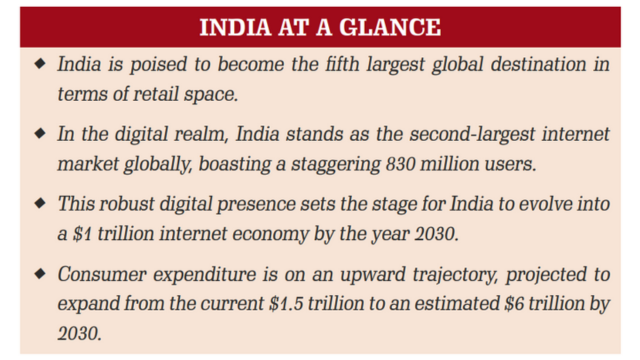Redefining Retail: A Leap Into the Future of Commerce

Retail
39 week ago — 10 min read
The Indian retail sector, recognised as one of the global leaders in market value, has seen remarkable growth. This surge is due to increased incomes, evolving lifestyles, and greater digital engagement. A major contributor to India’s GDP and employment, the sector is split into formal and informal segments. Retail in India has diversified into various formats, from traditional shops to online platforms. The sector’s evolution is driven by consumer awareness and high expectations, but it faces challenges like infrastructural needs, diverse customer behaviours, and complex supply chain issues. Nevertheless, the outlook for Indian retail remains optimistic, with strong potential for growth and adaptability to market shifts.
Major Retail Drivers
In the evolving Indian retail landscape, key megatrends are driving transformative changes.
- The burgeoning e-commerce sector, fuelled by smartphone proliferation, is reshaping retail dynamics, prompting traditional stores to adopt omnichannel strategies. Social media platforms are emerging as novel retail avenues, blending shopping with social engagement. Retailers are focusing on robust online presences and mobile-first experiences to stay competitive.
- The influence of Generation Z is profound, as their digital fluency and environmental consciousness dictate new retail norms. Retailers are aligning with Gen Z’s values, focusing on sustainability, ethical sourcing, and personalised engagement.
"Genz and millennial behaviours being targeted - the future customers. Look at the purpose of your business more than vision/mission.”
- B S Nagesh, Founder, TRRAIN
- Emerging markets in Tier 2 and Tier 3 towns offer new growth opportunities, demanding tailored strategies and localised content. Retailers are adapting to regional preferences and leveraging mobile platforms to penetrate these markets.
- Technological advancements, particularly AI and ML, are revolutionising retail operations, enhancing efficiency and personalisation. Investment in AI-powered platforms and automation technologies is becoming imperative for retailers.
- The wellness trend is gaining momentum, with a shift towards health and fitness products. Retailers are expanding their offerings to include wellness products and services, catering to a health-conscious consumer base.
Adapting to these trends is crucial for retailers to thrive in India’s dynamic retail environment, marked by digital innovation, changing consumer preferences, and evolving market landscapes.

Exploring the D2C Landscape
In India’s dynamic entrepreneurial landscape, Direct-to-Consumer (D2C) startups are redefining the way businesses engage with consumers. This approach is not confined to a specific sector but spans across various industries, offering personalized connections with the audience. Here are key strategies for building a successful D2C startup in India:
- Market Understanding: Deeply understand Indian market diversity, digital penetration, and consumer preferences.
- Niche Focus: Identify and cater to specific consumer needs, carving out a unique market segment.
- Omnichannel Distribution: Diversify across various sales channels, including online and physical stores.
- Efficient Supply Chain: Focus on optimising the supply chain for timely deliveries and reducing costs.
- Customer Engagement: Build brand trust through personalised experiences and active customer engagement.
- Adaptability: Stay agile and responsive to market shifts and regulatory changes.
- Data-Driven Decisions: Utilise data analytics for understanding consumer behaviour and scaling operations.
- Innovation and Expansion: Continually innovate and explore new markets to avoid saturation.
One Network for All
The Indian retail scene is witnessing a seismic shift with the advent of the Open Network for Digital Commerce (ONDC), initiated by the Government of India. This pioneering network is redefining the e-commerce landscape, breaking away from the monopoly of traditional digital marketplaces. ONDC’s unique approach enables seamless transactions between buyers and sellers across various platforms, fostering an inclusive and competitive environment. This network champions transparency and decentralisation, empowering small businesses and enhancing consumer choice. As ONDC gains momentum, it’s set to revolutionise the retail sector, offering a platform where diverse sellers can interact with buyers from different platforms, thus heralding a new era of digital commerce in India.
ONDC’s potential goes beyond reshaping the current market dynamics; it paves the way for a more inclusive digital economy. This initiative is poised to catalyze job creation across various sectors, including technology and retail. As ONDC grows, it is expected to foster a vibrant e-commerce ecosystem where smaller, local businesses can thrive alongside larger players. This platform represents a progressive step towards a more democratic and transparent online marketplace, promising a brighter future for the Indian e-commerce industry.
AI is revolutionising the Indian retail sector by enhancing customer experiences and optimising operational efficiency. It’s not just about improving the shopping journey; AI’s role extends to understanding consumer behaviours and enabling more personalised engagements. With 82% of Indians showing confidence in AI for better purchase experiences, the technology is set to redefine retail strategies. Indian consumers are increasingly comfortable with AI for personalised recommendations and decision-making. Retailers are leveraging AI for dynamic pricing and supply chain management, using data-driven insights for strategic decisions. The evolution of AI in retail promises a future where personalisation and efficiency are at the forefront, reshaping the retail landscape in India with innovative, AI-driven solutions.
"Innovating according to wants and needs, market trends. More than competing, it’s complimenting other businesses, working together. To fulfil various needs. New consumers coming into the online space have benefitted many businesses.”
- Sagar Daryani, Co-Founder & CEO, Wow! Momo Foods Pvt. Ltd.
There’s a growing emphasis on data-driven decision-making. Retailers are harnessing customer data to tailor marketing strategies, enhancing the relevance and effectiveness of their campaigns. This focus on big data analytics is not only improving customer targeting but also refining inventory management and operational efficiencies.
Another trend gaining traction is the integration of immersive technologies like Augmented Reality (AR) and Virtual Reality (VR) in retail. These technologies are creating engaging and interactive shopping experiences, bridging the gap between physical and digital retail spaces. AR in particular is enabling customers to visualise products in their environment before purchasing, adding a new dimension to online shopping.
"On the way technology has helped businesses and foresee vision technology, how are we going to sell and customise for customers.”
- Ashwin Khasgiwala, Chief of Business Operations, Reliance Retail Ltd.
According to a report by E&Y, the retail industry is embracing a significant shift with Generation AI (Gen AI), with an impressive 71% of retailers planning its adoption. This marks a pivotal moment, as Gen AI brings the capability to delve deep into unstructured data, offering enhanced customer experiences and operational efficiency. It promises not just a technological leap but a comprehensive transformation in retail strategies and consumer interactions. However, this innovation also raises important questions about privacy and ethical use of data. Retailers are thus gearing up for a future where technology plays a crucial role in shaping business and customer engagement.
What Should Retailers Keep in Mind?
In the dynamic Indian retail market, technology is a key connector, driving personalized advertising and engaging customers through AR, VR, AI, and chatbots. Customer feedback is paramount, necessitating omnichannel communication for gathering and responding to consumer insights. Retail is transitioning from separate online and physical spaces to an integrated “Intermix” approach, offering a seamless shopping experience. Loyalty programs need redefining to match contemporary consumer behaviour, focusing beyond mere purchases to overall experience. Commitment to sustainability is increasingly important, with consumers valuing eco-friendly practices. Finally, enhancing shopping experiences through hyper-personalised offerings and vernacular content is essential for engaging diverse consumer bases.
Also read: Enhanced Brand Storytelling in the Digital Age
Article source: STOrai Magazine
Image source: Canva
Disclaimer: The views and opinions expressed in this article are those of the author and do not necessarily reflect the views, official policy or position of GlobalLinker.
View STOrai 's profile
Other articles written by STOrai Magazine
The Art & Science of People Pleasing in Retail
14 week ago
Most read this week












Comments
Share this content
Please login or Register to join the discussion